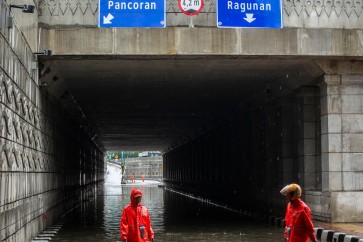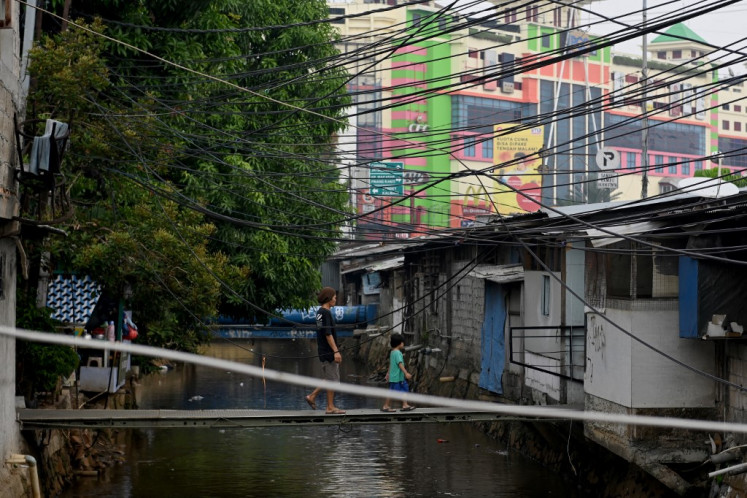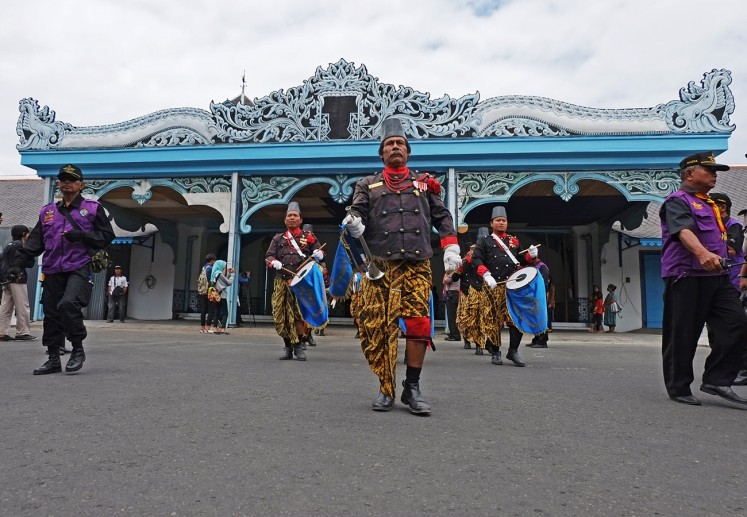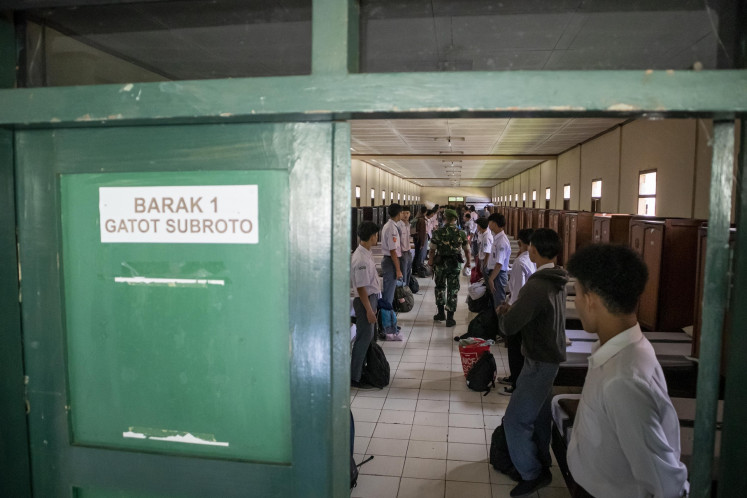Domestic submarine production 'milestone' for defense industry
Nation’s pride: The first domestically assembled submarine, KRI Alugoro 405, traverses Bali Strait in Banyuwangi, East Java, on Jan
Change text size
Gift Premium Articles
to Anyone

Nation’s pride: The first domestically assembled submarine, KRI Alugoro 405, traverses Bali Strait in Banyuwangi, East Java, on Jan. 21. (Antara/Budi Candra Setya)
In Javanese puppet stories, the alugoro was the weapon of Baladewa, the older brother of Kresna, the focal figure in the Hindu Mahabharata epic. The weapon, a gada (club) with two pointy ends, was said to have magnificent and massive destructive power.
The strength of the weapon inspired the name of Indonesia’s first domestically assembled submarine: KRI Alugoro 405.
The submarine, which was completed and launched in June last year, is the third vessel to have been built in an ongoing US$ 1.1 billion partnership between state-owned shipmaker PT PAL Indonesia and South Korean shipbuilder Daewoo Shipbuilding and Marine Engineering.
The Alugoro marked a milestone for Indonesia’s domestic defense industry amid demand for modernization of its primary weaponry defense system (alutsista). The government expressed pride that the success of assembling the Alugoro has made Indonesia the only country in Southeast Asia to build a submarine.
The 61.3-meter-long KRI Alugoro 405 is able to hold 40 crew members and cruise for up to 50 days. With a top speed of 11 knots when surfaced and 21.5 knots when underwater, the submarine can roam for 18,520 kilometers. The lifespan of the 1,460-ton vessel is projected to be 30 years, according to PAL.
The two other submarines, KRI Nagapasa 403 and KRI Ardadedali 404, were built and completed in South Korea in 2017 and 2018, respectively.
PAL kicked off a trial of the nominal diving depth (NDD) in waters north of Bali on Jan. 21, as part of the mandatory sea acceptance evaluation. The trials are to continue until June before the company officially hands the vessel over to the Defense Ministry to be used by the Indonesian Navy starting in December.
PAL Indonesia submarine division head Satriyo Bintoro said in a statement that the NDD phase was crucial to determining that 90 percent of the construction had been completed.
President Joko “Jokowi” Widodo also commended the submarine, calling it “sophisticated” as he went on board during an inspection of PAL’s shipyard in Surabaya, East Java on Monday.
"I think this is good collaboration because there is a transfer of technology in the assembly of our Alugoro submarine," Jokowi said during the visit, adding that he hoped the nation could soon fully develop and assemble its own submarines.
In a limited Cabinet meeting after the inspection, Jokowi said the success could be a milestone for Indonesia’s defense industry to gradually decrease dependence on imported alutsista. He called on his Cabinet to focus on reforming the ecosystem of the domestic defense industries.
Jokowi also called on local arms manufacturers to change their manufacturing approach from product-driven to market-driven in order to diversify their product portfolios to include nonmilitary products, as well as to increase domestic orders for the goods, which he said was vital to ensure the continuity of the domestic defense industry.
The Defense Ministry received the largest amount of funds from the state budget in the government’s bid to boost the domestic defense industry.
Indonesia's efforts to bolster its own defense industry received a strong boost after securing an order for an undisclosed number of medium tanks from the Philippines.
Deputy Defense Minister Wahyu Sakti Trenggono said the national defense industry has seen market prospects in African and Southeast Asian countries. "One of the biggest market prospects is Ghana, which bought the products made by PT Pindad [a state-owned weapons manufacturer]. So is the Philippines, which ordered tanks," he said
on Wednesday.
Still, a curated strategic plan must be in place to really catapult the domestic defense industry, Curie Maharani Savitri, a defense observer and academic of Bina Nusantara University, said. She said in comparison to other countries, Indonesian alutsista needed to catch up to compete in the global weaponry market.
"Our defense products were only exported to countries like Nepal, Turkey, South Korea and now the Philippines, countries that also lack defense technology. [...] We are still unable to target the first tier countries the hierarchy of the global weaponry producers such as the United States. That's because our weaponry technologies are not yet at the forefront of quality," she told The Jakarta Post. (trn)









